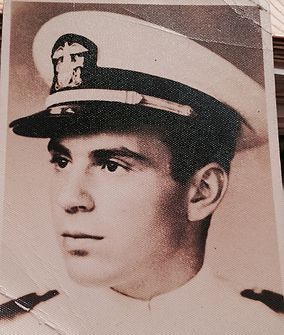
When Memorial Day comes around, I think of my husband's great-uncle. I have thought of him often since my brother died not quite two years ago. Young, handsome, and beloved by his parents and older brother and sisters, he chose to serve his country as an airman in the Navy. He never made it into WWII combat. At the age of 21 he was killed in a flight training accident on a base in Florida, a tragic loss.
I met my husband's grandfather and two great-aunts, his grandfather's sisters, many years later. All of them lived long lives, and one is still alive in her 90s. They had spouses, careers, and children; some had grandchildren and even lived to know great-grandchildren. They continued on. Before I lost my brother I didn't think that much about how they coped after their brother died, although I imagined it was terribly difficult and sad. Now, however, I have a completely different perspective on what they may have experienced in losing him. I look at the arc of their lives and see that they found a way to make the most of their days and to thrive. I want to know how they did it.
If you think about the vast scope of human experience, it becomes clear that countless numbers of people throughout history have found ways to cope with the loss of a loved one. Still, when I hear and read phrases like "Time heals," "It gets easier," and "It gets better," I wonder: Does it? And if so, how? And if not, how do the living keep going? I have worried, at times, about the fact that living without my brother does not yet seem easier. I have wondered if the time would come when I could string together enough qualifying "easier days" to be able to say, with conviction, "It got easier."
Some time ago I received a note from a friend who is coping with the devastating loss of his son. In it he said something that caught my attention. He wasn't sure, he said, that living with loss gets easier; but what he did know was that people get better at dealing with it.
Of course, I thought, struck by how much this made sense. Although living with loss might not get better, people become stronger and more skilled at it with time and effort, much as they do with any physical feat. Mt. Everest doesn't get lower or easier to climb -- but people work, and train, and try, and try again, and over time they become good enough climbers that they can reach the summit. The 135-mile Badwater Ultramarathon in Death Valley doesn't get shorter or cooler -- but people follow brutal training regimens for years and build up the strength to complete it. The English Channel doesn't get narrower or calmer -- but people work out and swim distances over and over, developing the stamina to get from one coast to the other.
Managing grief is a sort of training --
training that, like the work people do to stay physically fit, is ongoing.
No bereaved person trains in exactly the same way as anyone else. I suspect each person's best training regimen is unique to that person, loss, and circumstance, and it probably changes as needs change over time. Perhaps certain elements are more common than others. Right now my training features exercise, writing, therapy, time alone, talking to people who cared about my brother, and time with family. Another training element -- perhaps the most pivotal one -- is taking on the pain whenever and wherever I encounter it from day to day. I feel that evading my grief may compromise my ability to grow stronger. As my therapist says, grief waits for you. I'd rather face it as it comes than set it to the side where it could quietly grow more intense and more difficult to handle.
So I'm in training -- indefinitely. As with all training, I'm sure I will experience highs and lows, periods of getting stronger and times when I lose ground. But I am driven to build skill in coping with my grief. This work feels more possible than the idea of the grief mountain getting lower and more navigable on its own.
Thank you, Flight Cadet Ensign Paul Chaplitsky, for your service. Although your training ended much too soon, you continue to serve still, as your story and your family teach us lessons in how to live.
A previous version of this post entitled On Memorial Day: Training continues was originally published at Life Without Judgment by Sarah Lyman Kravits at www.lifewithoutjudgment.com.
